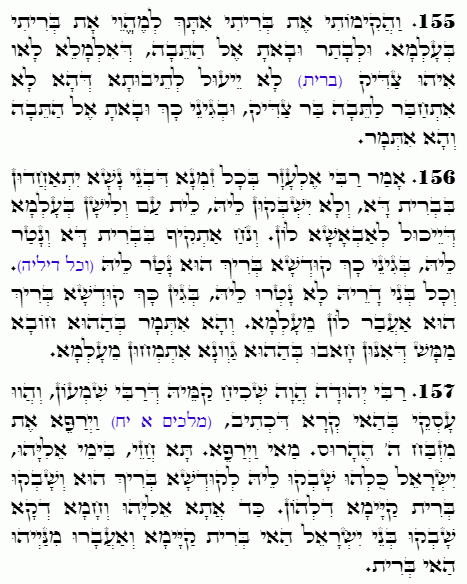Daily Zohar # 4689 – Noach – Repair your altar
Daily Zohar 4689

Hebrew translation:
156. אָמַר רַבִּי אֶלְעָזָר, בְּכָל זְמַן שֶׁבְּנֵי אָדָם יֶאֶחְזוּ בִּבְרִית זוֹ וְלֹא יַעַזְבוּ אוֹתָהּ, אֵין עַם וְלָשׁוֹן בָּעוֹלָם שֶׁיּוּכְלוּ לְהָרַע לָהֶם. וְנֹחַ הֶחֱזִיק בִּבְרִית זוֹ וְשָׁמַר אוֹתָהּ, וְלָכֵן שָׁמַר אוֹתוֹ הַקָּדוֹשׁ בָּרוּךְ הוּא [וְכָל אֲשֶׁר לוֹ]. וְכָל בְּנֵי דוֹרוֹ לֹא שָׁמְרוּ אוֹתָהּ, וְלָכֵן הֶעֱבִיר אוֹתָם הַקָּדוֹשׁ בָּרוּךְ הוּא מֵהָעוֹלָם. וַהֲרֵי נֶאֱמַר, בְּאוֹתוֹ חֵטְא מַמָּשׁ שֶׁהֵם חָטְאוּ – בְּאוֹתוֹ גָוֶן נִמְחוּ מֵהָעוֹלָם.
157. רַבִּי יְהוּדָה הָיָה מָצוּי לִפְנֵי רַבִּי שִׁמְעוֹן, וְהָיוּ עוֹסְקִים בַּפָּסוּק הַזֶּה שֶׁכָּתוּב (מלכים-א יח) וַיְרַפֵּא אֶת מִזְבַּח ה’ הֶהָרוּס. מַה זֶּה וַיְרַפֵּא?. בֹּא רְאֵה, בִּימֵי אֵלִיָּהוּ כָּל יִשְׂרָאֵל עָזְבוּ אֶת הַקָּדוֹשׁ בָּרוּךְ הוּא וְעָזְבוּ אֶת בְּרִית הַמִּילָה שֶׁלָּהֶם. כְּשֶׁבָּא אֵלִיָּהוּ וּרְאֵה שֶׁעָזְבוּ בְּנֵי יִשְׂרָאֵל בְּרִית מִילָה הַזּוֹ וְהֶעֱבִירוּ מֵהֶם אֶת הַבְּרִית הַזּוֹ.
.
Zohar Noach
Continued from previous DZ
#155
“And I will establish My covenant with you” (Genesis 6:18). This means that you (Noah) will be My covenant in the world. Only afterward is it said, “And you shall come into the Ark.” For if there were not a righteous person, he would not have entered the Ark because only a righteous person can connect with the Ark. This is why it is written, “And you shall come into the Ark” after “And I will establish My covenant with you.” This has already been explained.
#156
Rabbi Elazar said that as long as people uphold this covenant, no nation in the world can harm them. Noah upheld this covenant and kept it faithfully, and for this reason, the Holy One, Blessed be He, protected him. But the rest of his generation did not keep the covenant (בְרִית), and therefore, the Holy One, Blessed be He, removed them from the world. It has been said that they were erased from the world in the same manner as the sin they committed.
Notes:
Rabbi Elazar emphasizes that when people remain faithful to the covenant (בְרִית), they are protected from any external threats, regardless of the power or hostility of other nations. The covenant is associated with Brit Milah (circumcision) and spiritual integrity and serves as a shield that safeguards those who honor it.
The Zohar stresses the protective power of the covenant and its importance in maintaining a connection to Hashem. Like Noah, those who honor the covenant are granted protection from harm, even amidst widespread judgment and destruction. In contrast, those who abandon or violate the covenant face severe consequences, as seen in the generation of the Flood. This passage serves as a reminder of the spiritual and moral responsibilities tied to the covenant, emphasizing that fidelity to this agreement with Hashem ensures survival and aligns one with Hashem’s will. In contrast, betrayal leads to dissolution and disconnection from Hashem.
#157
Rabbi Yehuda was with Rabbi Shimon, and they were discussing this verse, which says, “וַיְרַפֵּא אֶת מִזְבַּח ה’ הֶהָרוּס” “And he repaired the altar of YHVH that had been torn down” (1 Kings 18:30). What does it mean here, “he repaired”? Come and see: In the days of Elijah, all of Israel abandoned the Holy One, Blessed be He, and forsook their holy covenant. When Elijah came and saw that the people of Israel had abandoned the sacred covenant, which had been removed from them, he sought to restore the matter to its proper place. That is, he came to restore the Yessod so that it would be fit to unite with Malchut. This is considered the healing of the altar, which represents Malchut, as will be explained further.
Notes:
Elijah’s repair of the altar is portrayed as an act of spiritual healing. It addresses the broken state of the covenant and reestablishes the connection between Yessod and Malchut. This restoration is necessary for the Light of Hashem to be properly channeled into the world. The passage highlights the role of the Tzadikim, like Elijah, in restoring and maintaining the integrity of the covenant, ensuring that Hashem’s presence can dwell among the people.
{||}

 Previous: Noach
Previous: Noach

